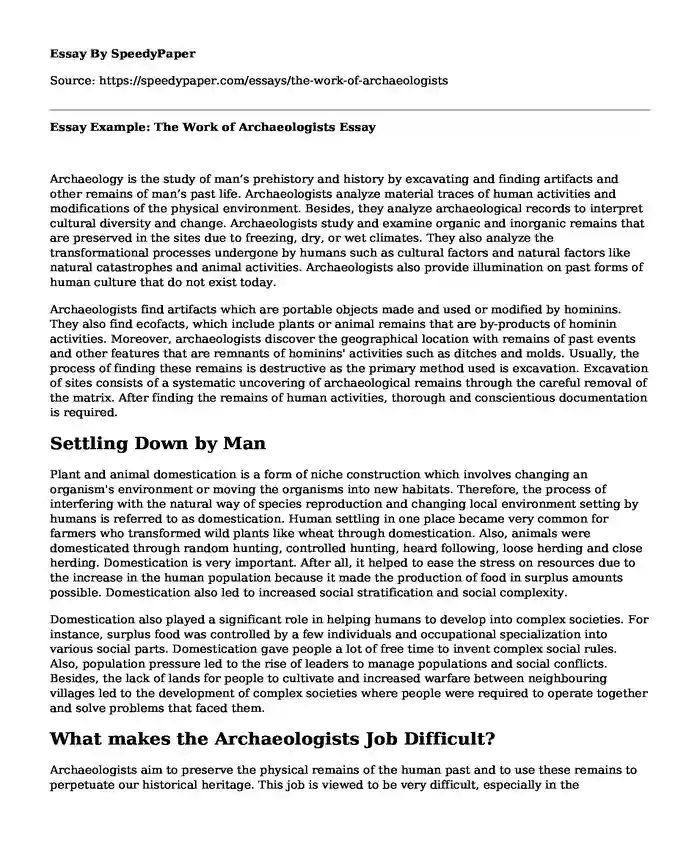
| Type of paper: | Essay |
| Categories: | Science Job Profession |
| Pages: | 3 |
| Wordcount: | 645 words |
Archaeology is the study of man’s prehistory and history by excavating and finding artifacts and other remains of man’s past life. Archaeologists analyze material traces of human activities and modifications of the physical environment. Besides, they analyze archaeological records to interpret cultural diversity and change. Archaeologists study and examine organic and inorganic remains that are preserved in the sites due to freezing, dry, or wet climates. They also analyze the transformational processes undergone by humans such as cultural factors and natural factors like natural catastrophes and animal activities. Archaeologists also provide illumination on past forms of human culture that do not exist today.
Archaeologists find artifacts which are portable objects made and used or modified by hominins. They also find ecofacts, which include plants or animal remains that are by-products of hominin activities. Moreover, archaeologists discover the geographical location with remains of past events and other features that are remnants of hominins' activities such as ditches and molds. Usually, the process of finding these remains is destructive as the primary method used is excavation. Excavation of sites consists of a systematic uncovering of archaeological remains through the careful removal of the matrix. After finding the remains of human activities, thorough and conscientious documentation is required.
Settling Down by Man
Plant and animal domestication is a form of niche construction which involves changing an organism's environment or moving the organisms into new habitats. Therefore, the process of interfering with the natural way of species reproduction and changing local environment setting by humans is referred to as domestication. Human settling in one place became very common for farmers who transformed wild plants like wheat through domestication. Also, animals were domesticated through random hunting, controlled hunting, heard following, loose herding and close herding. Domestication is very important. After all, it helped to ease the stress on resources due to the increase in the human population because it made the production of food in surplus amounts possible. Domestication also led to increased social stratification and social complexity.
Domestication also played a significant role in helping humans to develop into complex societies. For instance, surplus food was controlled by a few individuals and occupational specialization into various social parts. Domestication gave people a lot of free time to invent complex social rules. Also, population pressure led to the rise of leaders to manage populations and social conflicts. Besides, the lack of lands for people to cultivate and increased warfare between neighbouring villages led to the development of complex societies where people were required to operate together and solve problems that faced them.
What makes the Archaeologists Job Difficult?
Archaeologists aim to preserve the physical remains of the human past and to use these remains to perpetuate our historical heritage. This job is viewed to be very difficult, especially in the preservation and destruction of archaeological records. Conservation of archaeological database: Field notes, maps photographs, sketches, field records and reports have proved to be very difficult. Moreover, retention and access to these materials is a problem for all archaeologists. Besides, most archaeological files like administrative records, biographical data, unpublished documents and other pieces of evidence are found in deplorable conditions. Archaeologists are also facing the challenge of the records becoming physically degraded and scattered due to lack of proper storage facilities, use of improper methods of curation and insufficient funds to hire professional archivists.
The work of archaeologists is made further challenging due to destruction of the archaeological sites and records. Archaeological sites are usually destroyed by natural calamities like floods, tsunamis and earthquakes. Such phenomena lead to damage of the evidence obtained as some materials like fossils are displaced or lost. Moreover, archaeological records like photographic media can be destroyed by pests, chemicals or physical damage by the preserver. In some instances', documents can be destroyed by fire, humidity or even be stolen from the archives.
Cite this page
Essay Example: The Work of Archaeologists. (2023, Sep 27). Retrieved from https://speedypaper.com/essays/the-work-of-archaeologists
Request Removal
If you are the original author of this essay and no longer wish to have it published on the SpeedyPaper website, please click below to request its removal:
- Introduction of Robotics in Factories. Free Essay Sample.
- Free Essay Sample: Contrast Dye Side Effects Analysis
- Free Essay with Sleep Deprivation Study
- Free Essay Sample on Importance of Detection of Uncarboxylated Osteocalcin
- Free Essay: Physical Therapist in the Military Field
- Essay Example About Causes of Birth Defects
- Free Essay. Issues Of 'Professionalism' and 'Professional Practice' In Relation to Home Economics
Popular categories




